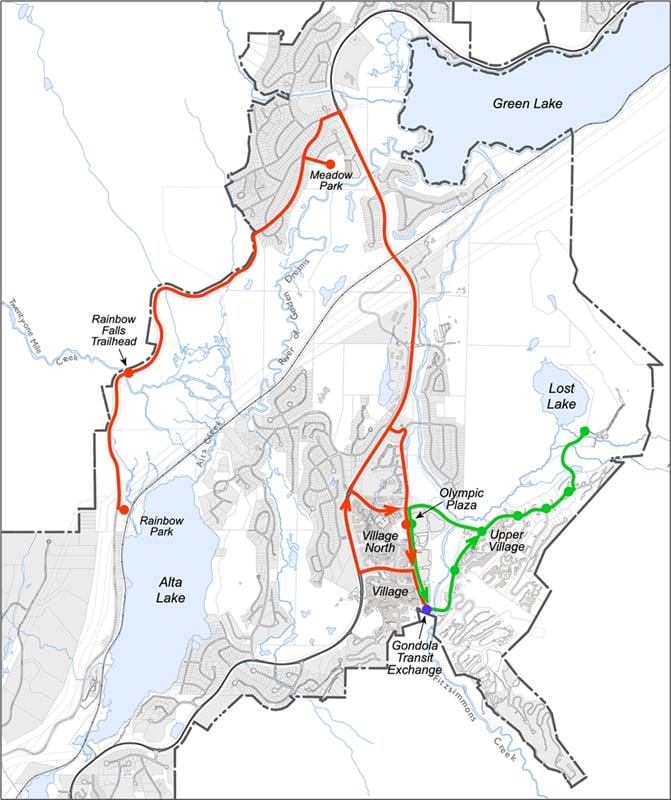
Plan your route within Whistler
Read more about accessibility.
Plan your route to and from Whistler by shuttle bus
Transit service throughout the year
Buses in the Whistler Transit system run from 5:20 a.m. to 3 a.m. daily and additional service is offered in winter.
Buses are free on summer weekends and statutory holidays from Canada Day to Labour Day, as well as Victoria Day, Thanksgiving Day, and National Day for Truth and Reconciliation. This program is made possible by revenue from pay parking in Day Lots 1 to 5. The Resort Municipality of Whistler’s New Year’s Eve Special service includes free service all day within Whistler.
The Village Shuttles are free year-round.
A free Park and Spook Shuttle runs on Halloween from Marketplace Parking lot to the trick-or-treating in Tapley’s Neighbourhood. The shuttle runs from 5 to 8:30 p.m. and parking at Marketplace is free during these times.
To meet demand, we run additional buses in the winter. The bus schedule changes on the below dates. Read about holiday service.
Spring, summer, fall schedule: April 22 to November 2025 (PDF)
Winter schedule runs from mid-November to mid-April
In winter, Route 7: the Staff Housing bus is free from 6 p.m. to 8 a.m. Whistler Blackcomb funds this free evening and morning transit to Glacier Staff Housing at Base 2 on Blackcomb Mountain for their staff, outside the hours when staff can take Excalibur Gondola.
Fares and passes
Find where to purchase passes. Umo offers passes through an app or reloadable app.
Purchasing six- and twelve-month passes at Municipal Hall
Six Month Adult Pass: $270
Six Month Concession Pass for students and people over age 65: $215
Six Month Spirit Pass, requires Whistler Experience number: $220
12 Month Adult Pass: $510
12 Month Concession Pass for students and people over age 65: $410
Six Month Spirit Pass, requires Whistler Experience number: $410
See below for details on the Whistler High School and Grade 7 Bus Pass.
Location:
Municipal Hall Customer Service
4325 Blackcomb Way, Whistler, BC
V8E 0X5
Open Monday to Friday 9 a.m. to 4 p.m. excluding Statutory Holidays
Free Lost Lake Park and Rainbow Park shuttles
The Lost Lake Park shuttle service runs daily from 11 a.m. to 7 p.m., between June 21 and Labour Day in September.
The Rainbow Park service runs on weekends and statutory holidays, every 15 minutes from 10 a.m. to 6 p.m., beginning on June 21, 2025 and ending on the last day of the Labour Day long weekend.
The shuttle is free and at least one of the two shuttles on each route is wheelchair-accessible. View the accessible shuttle using the real-time shuttle location: look for the arrow labelled “bus A accessible”.
Lost Lake Park shuttle schedule
The buses run from the Village at and Olympic Plaza Bus Stop and Gondola Transit Exchange Bay 4 . The shuttle stops at all transit stops between the Gondola Transit Exchange and Lost Lake Park. The accessible shuttle operates 11 a.m. to 6 p.m.
Daily schedule:
- 11 a.m. to 2 p.m. every 20 minutes
- 2 p.m. and 6 p.m. every 10 minutes
- 6 p.m. to 7 p.m. every 20 minutes
Route:
- Blackcomb Way Olympic Plaza Bus Stop
- Gondola Transit Exchange Bay 4
- Upper Village transit stops along Blackcomb Way
- Lost Lake parking lot
- Upper Village transit stops along Blackcomb Way
- Blackcomb Way Olympic Plaza Bus Stop
Rainbow Park shuttle schedule
The buses run from the Village at Olympic Plaza Bus Stop and Gondola Transit Exchange Bay 4.
Weekend and statutory holiday schedule
- 10 a.m. to 6 p.m. every 15 minutes.
Route:
- Blackcomb Way Olympic Plaza Bus Stop
- Gondola Transit Exchange Bay 4
- Meadow Park Waterpark
- Rainbow Falls trail head
- Rainbow parking lot
- Blackcomb Way Olympic Plaza Bus Stop
More park shuttle information
You can park in the Village Day Lots.
The shuttles are accessible to wheelchairs, strollers and compact mobility devices.
No pets. Only service animals can travel on the bus.
Please wear dry clothes and footwear. You can bring dry, clean food coolers and deflated paddleboards. Hard watercraft and barbeques are not permitted.
Park shuttle lost and found: whistlerparkshuttle@luxbus.com
Live chat: 778-715-0490

Whistler High School and Grade 7 Bus Pass
The High School Bus Pass covers transit within Whistler. It is for students attending grades 7 to 12. The 2025-2027 registration is now open. Passes are delivered through Whistler Secondary School, the Whistler Waldorf School and SD48 online school at the start of the school year. Children who live in Whistler, but don’t attend those schools can email transit@whistler.ca or visit Municipal Hall customer service to confirm eligibility.
View terms and conditions (PDF)
About local transit
Local transit in Whistler is provided through a partnership between the Resort Municipality of Whistler and BC Transit delivered by the contracted operating company Whistler Transit Ltd.
The Park Shuttles are contracted by the Resort Municipality of Whistler through a separate contract with Luxury Transport.
The free Village Shuttles (routes 4 and 5) and the free Park Shuttle routes are funded by the provincial Resort Municipality Initiative (RMI) and Municipal and Regional District Tax (MRDT).
Many transit programs, including free transit at summer weekends and on statutory holidays, and free bike parking receive funding through the Community Transportation Initiative Fund. This Fund is generated by user pay parking in Day Lots 1 to 5. Day Lots 1 to 5 are managed by the Day Lot Operating Committee, a partnership between the RMOW and Whistler Blackcomb.